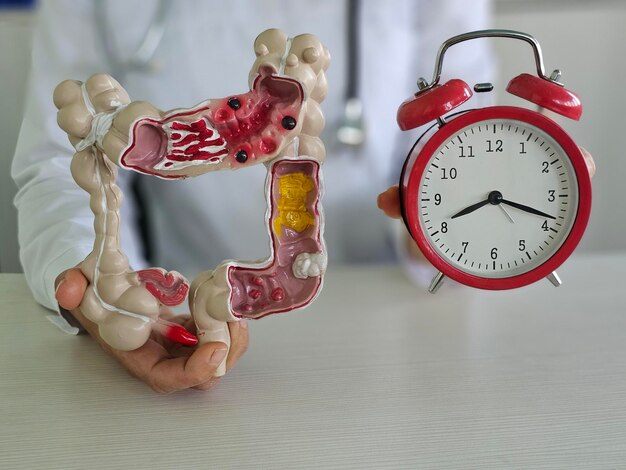
Table of Contents
Constipation is a common problem that everyone has experienced at least once, regardless of age.
Other than having fewer bowel movements than usual or struggling to push out feces, constipation causes one to feel as if they have not completely emptied their bowels.
Several factors may lead to constipation, such as an individual’s nutrition, chronic lack of exercise, drinking low quantities of water, and consuming medicine.
Occasionally, constipation is not alarming. However, if it persists daily for several months, it warrants concern. Such conditions may make the man’s life miserable and may also indicate other diseases.
Effective management of constipation involves addressing the symptoms and understanding the underlying causes. This comprehensive approach is critical to successful treatment.
This guide is not just about identifying the aspects of constipation; it’s a practical resource that focuses on actionable remedial options. It includes lifestyle changes and medications that are readily available.
Understanding the parameters of these treatment procedures is essential for persons who wish to self-manage low back discomfort.
For those with such symptoms relatively infrequently and those with chronic ones, the following sections will be interesting to you as they provide enough details to help you locate the most appropriate course of treatment.
The management of constipation is a multifaceted affair, but it most often involves correcting diet and lifestyle.
Another significant cause is hypertension. Water enhances soft stool formation, making it easier to pass stool out.
Many individuals who do not drink enough water compensate for their caffeine or alcohol intake with water, leading to hard, dry stools.
A sedentary lifestyle fortifies the bowels even more. Adequate physical exercise is essential, as it helps with bowel movement by ensuring the unimpeded flow of peristaltic waves.
Further, some drugs, such as analgesics, selective serotonin reuptake inhibitors, and aluminum or calcium-containing antacids, can also become productive factors.
Medical diseases such as IBS, diabetes, lactation and hyperthyroidism, and neurologic disorders do worsen the situation by dislocating bowel functions and promoting increased stool retention.
How Does Dietary Change Help to Alleviate Constipation?

Diet changes are crucial in managing constipation. By making simple adjustments to your diet, you can directly affect the functioning of your digestive system, offering hope and optimism for improved bowel health.
Increasing dietary fiber can relieve constipation. This can be achieved by eating more fruits, vegetables, legumes, and whole grains.
Other than fiber, though, a reasonable quantity of water must also be consumed to prevent constipation. Adequate water intake during the day helps soften stool and ease bowel movements.
Reducing processed fatty foods and excess dairy products can improve digestive health.
Most of the processed food available is low in fiber, while foods that contain an excess of fats may lengthen the time involved in digestion.
Probiotic foods, including yogurt and fermented vegetables, eaten daily can help regulate bowel habits and ensure the overall well-being of the intestines.
A well-balanced diet, along with a reasonable intake of fiber and water, may help decrease the occurrence and severity of constipation.
Which Changes Daily Help With the Management of Constipation?

Patients with constipation can benefit from lifestyle changes as much as dietary changes in managing the condition.
The first lifestyle habit to consider is the level of physical activity that constitutes part of an individual’s daily routine.
Regular exeindividual’scilitate bowel movements via stretching the intestine and moving the bowels more often.
Regular physical activity, such as walking, jogging, running, swimming, or yoga, can considerably enhance the frequency of bowel movements.
Committing to at least 150 minutes of moderate-intensity aerobic physical workouts per week can significantly improve your digestive health and overall well-being.
Physical exercises, such as walking, jogging, running, swimming, or yoga, are expected to enhance bowel movement frequency considerably.
Establishing a routine can be beneficial for those with constipation. Setting a specific time for bowel movements, preferably after mealtime, can help maintain a healthy bowel routine.
Changing the environment in the restroom to be more enjoyable and lowering the level of stress experienced by the patients can also help improve their routines and bowel movements.
Interventipatient’sas meditation and deep-breathing exercises can relieve stress and consequently improve gut health. Stress, for example, may provoke disturbances of the digestive tract or intestine, leading to disorders like constipation.
Reducing sedentary time in one position and encouraging regular motion throughout the day is also helpful in assisting with slow digestion.
Even minor alterations in the usual rhythm of life, such as stretching or standing up to take a short walk, may satisfactorily transform the situation.
What Over-the-Counter Medicines Can Help Relieve Constipation?

In patients for whom dietary changes and lifestyle alterations are ineffective, OTC treatments can provide short-term relief. Laxatives are the most frequently OTC items, and most of the drugs are laxatives that work through one of three mechanisms:
For example, bulk-forming laxatives include Psyllium (Metamucil) and methylcellulose (Citrucel). These laxatives absorb stool water in the intestines, increasing stool size and frequency.
However, it is advocated that such laxatives be used along with adequate water intake to avoid worsening constipation.
Stimulant laxatives: Such Products as bisacodyl (Dulcolax) and senna work by irritating the muscular layer of the intestine, which achieves the desired functional relaxation and evacuation faculties of the bowel.
But those philosophers practice dependence; abstaining from menstrual periods is generally fruitless.
Osmotic laxatives: Many types of osmotic laxatives, including polyethylene glycol (MiraLAX) and magnesium citrate, are increasingly popular in the US because they are easy to use.
They are also more advanced stage therapies for patients with constipation. They are effective whenever fecal impaction is present.
Lubricator laxatives: One more mineral oil lubricant laxative alleviates the pressure and promotes the smooth excretion of feces. However, as a side effect, it should not be used as a medication for the ill, for instance, in complex swallowing cases.
This mineral oil is safe for use but may be harsh on the individual, so it should not be considered the first-line solution. Alternatively, symptoms that may indicate a severe condition require seeking a medical professional.
When do you need the physician’s assistance to relieve unease caused by constipaphysician’slast thing that people would like is to go through or experience an attack of constipation.
People suffering from constipation should not be familiar, and the measures used in the management of the condition should be more prophylactic.
The main reason people tend to visit the physician in this circumstance is due to, in combination, severe abdominal pain, bloody stools, and very loose, watery stools. Such patients would require intervention in a medical facility.
Chronic constipation, which includes passing fewer than three stools per week for a prolonged period even when it is the boaster of medical conditions, is the most severe case that needs to be treated medically, but it’s not the only instance.
This is crucial if self-care activities such as dietary or alteration in lifestyle and other drugs are ineffective.
Chronic constipation that requires treatment may also be attributed to other medical conditions such as irritable bowel syndrome, hypothyroidism, and various neurological disorders.
People over the age of fifty and people with a family history of colon cancer are also registered with medical conditions when there is a change in bowel habits.
Some procedures, such as colonoscopies, may also be recommended to rule out the possibility of any severe condition needing attention as part of routine healthcare. Finally, it is always best to seek advice from a medical professional for intolerable or troubling symptoms.
FAQ’s
How to lessen the chances of constipation?
Enhancing intake, expanding fluid intake, and engaging in physical activity to control con is advisable.
What to avoid in case of constipation?
Excessive consumption of laxatives should be avoided as they may have a habit-forming effect and aggravate the problem.
What medicine is most effective when treating constipation?
The most appropriate treatment options usually involve adding extra fibers, such as psyllium fiber, and osmotic laxatives like polyethylene glycol, but this depends on the individual.
Which of the medicines provides the most rapid action in case of constipation?
Stimulants such as bisacodyl or senna laxatives can help instantly relieve because they take effect within a few hours.
Conclusion
Identifying the factors, including visceral hypersensitivity and functional, can be a rather distressing clinical condition but has several viable management.
Different dietary and lifestyle changes, combined with some over-the-counter medicines and clinical intervention when appropriate, could help manage constipation efficiently.
Learning how to eliminate the sudden urge to defecate cold turkey is likely to benefit treatment response and general health.
